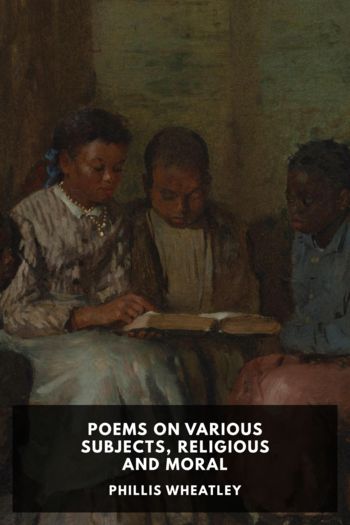The Autobiography of Benjamin Franklin - Benjamin Franklin (pocket ebook reader .txt) 📗

- Author: Benjamin Franklin
Book online «The Autobiography of Benjamin Franklin - Benjamin Franklin (pocket ebook reader .txt) 📗». Author Benjamin Franklin
“Not found in the manuscript journal, which was left among Franklin’s papers.” —Bigelow ↩
A crimp was the agent of a shipping company. Crimps were sometimes employed to decoy men into such service as is here mentioned. ↩
The creed of an eighteenth century theological sect which, while believing in God, refused to credit the possibility of miracles and to acknowledge the validity of revelation. ↩
A great English poet, dramatist, and critic (1631–1700). The lines are inaccurately quoted from Dryden’s Oedipus, Act III, Scene I, line 293. ↩
A Spanish term meaning a combination for political intrigue; here a club or society. ↩
A sheet 8½ by 13½ inches, having the words pro patria in translucent letters in the body of the paper. Pica—a size of type; as, A B C D: Long Primer—a smaller size of type; as, A B C D. ↩
To arrange and lock up pages or columns of type in a rectangular iron frame, ready for printing. ↩
Reduced to complete disorder. ↩
I got his son once £500. —Marg. note ↩
Recalled to be redeemed. ↩
This part of Philadelphia is now the center of the wholesale business district. ↩
Paper money is a promise to pay its face value in gold or silver. When a state or nation issues more such promises than there is a likelihood of its being able to redeem, the paper representing the promises depreciates in value. Before the success of the Colonies in the Revolution was assured, it took hundreds of dollars of their paper money to buy a pair of boots. ↩
Mrs. Franklin survived her marriage over forty years. Franklin’s correspondence abounds with evidence that their union was a happy one. “We are grown old together, and if she has any faults, I am so used to them that I don’t perceive them.” The following is a stanza from one of Franklin’s own songs written for the Junto:
“Of their Chloes and Phyllises poets may prate,
I sing my plain country Joan,
These twelve years my wife, still the joy of my life,
Blest day that I made her my own.”
↩
Here the first part of the Autobiography, written at Twyford in 1771, ends. The second part, which follows, was written at Passy in 1784. ↩
After this memorandum, Franklin inserted letters from Abel James and Benjamin Vaughan, urging him to continue his Autobiography. ↩
Franklin expressed a different view about the duty of attending church later. ↩
Compare Philippians 4:8. ↩
A famous Greek philosopher, who lived about 582–500 BC. The Golden Verses here ascribed to him are probably of later origin. “The time which he recommends for this work is about even or bedtime, that we may conclude the action of the day with the judgment of conscience, making the examination of our conversation an evening song to God.” ↩
This “little book” is dated July 1, 1733. —W. T. F. ↩
“O philosophy, guide of life! O searcher out of virtue and exterminator of vice! One day spent well and in accordance with thy precepts is worth an immortality of sin.” —Tusculan Inquiries, Book V ↩
Professor McMaster tells us that when Franklin was American Agent in France, his lack of business order was a source of annoyance to his colleagues and friends. “Strangers who came to see him were amazed to behold papers of the greatest importance scattered in the most careless way over the table and floor.” ↩
While there can be no question that Franklin’s moral improvement and happiness were due to the practice of these virtues, yet most people will agree that we shall have to go back of his plan for the impelling motive to a virtuous life. Franklin’s own suggestion that the scheme smacks of “foppery in morals” seems justified. Woodrow Wilson well puts it: “Men do not take fire from such thoughts, unless something deeper, which is missing here, shine through them. What may have seemed to the eighteenth century a system of morals seems to us nothing more vital than a collection of the precepts of good sense and sound conduct. What redeems it from pettiness in this book is the scope of power and of usefulness to be seen in Franklin himself, who set these standards up in all seriousness and candor for his own life.” See Galatians, chapter V, for the Christian plan of moral perfection. ↩
Nothing so likely to make a man’s fortune as virtue. —Marg. note ↩
This is a marginal memorandum. —B. ↩
The almanac at that time was a kind of periodical as well as a guide to natural phenomena and the weather. Franklin took his title from Poor Robin, a famous English almanac, and from Richard Saunders, a well-known almanac publisher. ↩
June 23 and July 7, 1730. —Smyth ↩
See “A List of Books written by, or relating to Benjamin Franklin,” by Paul Leicester Ford. 1889. p. 15. —Smyth ↩
Dr. James Foster (1697–1753):—
“Let modest Foster, if he will excel
Ten metropolitans in preaching well.”
“Those who had not heard Farinelli sing and Foster preach were not qualified to appear in genteel company,”
Hawkins, History of Music—Smyth ↩
“The authority of Franklin, the most eminently practical man of his age, in favor of reserving the study of the dead languages until the mind has reached a certain maturity, is confirmed by the confession of one of the most eminent





Comments (0)